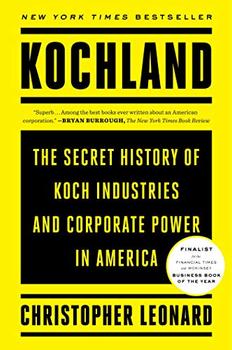Summary | Excerpt | Reviews | Beyond the Book | Readalikes | Genres & Themes | Author Bio
The Secret History of Koch Industries and Corporate Power in America

Critics' Opinion:
Readers' Opinion:
First Published:
Aug 2019, 704 pages
Paperback:
Oct 2020, 704 pages
 Book Reviewed by:
Book Reviewed by:
Kim Kovacs
Buy This Book
P R E FACE
The Fighter
(1967–2019)
On May 18, 1981, four Wall Street bankers traveled to Wichita, Kansas. They went there to make an offer to Charles Koch, the CEO of an obscure, midsize energy company. The bankers, from Morgan Stanley, wanted to convince Koch to take his family's company public, offering shares for sale on the New York Stock Exchange. Their deal was squarely in line with the conventional wisdom of corporate America at the time. Going public was seen as a natural progression for companies like Koch Industries, offering them access to big pools of money and promising enormous paydays for the existing team of executives. All it required from the CEO was to surrender control. Morgan Stanley, in return, would collect a small fortune in fees.
Charles Koch was forty-five years old. He had run Koch Industries since he was thirty-two, when his father died suddenly. He was trim, tall, and had an athlete's build. He spoke quietly in meetings and seemed almost passive. The bankers laid out their plan to take Koch public. They revealed what, to most executives, at least, might have been the most significant detail: if Charles Koch agreed to the deal, he could earn $20 million overnight. The bankers seemed incredulous when they prepared a confidential memo about Koch's reaction.
"He does not want this cash," the memo reported.
Charles Koch calmly explained to them why their offer made no sense. His company was breathtakingly profitable. It operated in vital, deeply complex corners of the American energy industry. During the 1980s, Koch Industries was the largest purchaser and transporter of US crude oil. It owned an oil refinery. It employed teams of commodities traders who bought and sold a wildly diverse menu of raw materials and financial products, from gasoline to paper futures contracts. This might have encouraged most CEOs to take their company public. Koch Industries, however, did not want outsiders to know how much money its traders were earning. Taking the company public would expose too many of its secrets.
"Certain of [Koch's] commodity traders are particularly worried that their high salaries, once disclosed to the public, would be used against them by their trading partners," the memo said.
Secrecy was a strategic necessity for Koch Industries. Charles Koch did not want to surrender it. He also didn't want to surrender control. He had a specific, clear vision of how to run his company, and he didn't need Wall Street investors to interfere.
If the bankers expected Charles Koch to go along with the conventional wisdom of their time, then they, like so many outsiders, did not understand him. Beneath his low-key veneer, Charles Koch was, at his core, a fighter. He had unmovable ideas about how things should be, and he did not back down when challenged. When he was challenged by his own brothers for control of Koch Industries, he fought them in a bitter legal battle that lasted decades. When he was challenged by members of a powerful labor union during his first years as CEO, he fought them even as they committed an act of industrial sabotage that nearly destroyed Koch's oil refinery. When the FBI and the US Department of Justice launched a criminal investigation into Koch Industries' oil gathering business, Charles Koch fought them with every legal and political tool at his disposal. When a liberal Congress and President Barack Obama sought to impose regulations on the fossil fuel industry to control greenhouse gas emissions, Charles Koch fought them in ways that changed US politics.
In each of these fights, Charles Koch prevailed.
When Charles Koch dismissed the bankers in 1981, it was just a small skirmish in the larger war to control Koch Industries. After prevailing in that fight, he created a company that was true to his vision. He avoided the snares that entangled many publicly traded companies that report their financial results to investors every three months. Koch Industries didn't have to think quarter to quarter. The company thinks year to year. An internal think tank and deal-making committee, called the development group, will sometimes think through a business deal on a timeline measured in decades. This long-term view made Koch nimble where other companies stumbled. In 2003, for example, Koch Industries bought a group of money-losing fertilizer plants when no publicly traded company was willing to take the risk. Today those plants are as profitable as a broken ATM machine that spews out cash around the clock. Unlike publicly traded companies, Koch Industries does not pay out rich dividends to investors. Charles Koch insists on reinvesting at least 90 percent of the company's profits, fueling its constant expansion.
From KOCHLAND: The Secret History of Koch Industries and Corporate Power in America by Christopher Leonard. Copyright © by Christopher Leonard. Reprinted by permission of Simon & Schuster, Inc.





The House on Biscayne Bay
by Chanel Cleeton
As death stalks a gothic mansion in Miami, the lives of two women intertwine as the past and present collide.

The Flower Sisters
by Michelle Collins Anderson
From the new Fannie Flagg of the Ozarks, a richly-woven story of family, forgiveness, and reinvention.

The Funeral Cryer by Wenyan Lu
Debut novelist Wenyan Lu brings us this witty yet profound story about one woman's midlife reawakening in contemporary rural China.
Your guide toexceptional books
BookBrowse seeks out and recommends the best in contemporary fiction and nonfiction—books that not only engage and entertain but also deepen our understanding of ourselves and the world around us.